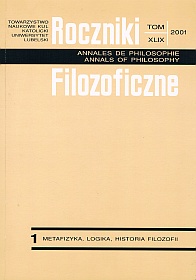Contemporary formal logic and the natural sciences
Abstract
In the first part of the article the questions are discussed that are connected with applying the rules of classical sentence logic and many valued logic in theories of natural sciences, mainly in N. Bohr' s theories of complementarity. This part of the article explicates Z. Zawirski's proposition, that the rules of logic, through applying them to the world, not only stop being tautologies that do not say anything about the reality, but they become natural hypotheses that say a lot, perhaps "the first things”, about that reality. In the article the possibility is shown of using the rules of building axiomatic deductive systems of classical logical calculus in construction of corresponding axiomatic systems in physics, as an axiomatic system may well represent an empirical theory. In the second part of the article the relations of contemporary non-classical kinds of logic with natural sciences are discussed. A lot of attention is devoted to showing that in natural sciences, in physics, application of formal logic may also consist in suitable use of its language. Not only is the language of classical logical calculus involved here but the language of systems of non-classical logics as well, and especially of the ones which give the rules for correct use of functors connected with the following - crucial for natural sciences - terms: time, change, causal relationship.
Copyright (c) 2001 Roczniki Filozoficzne

This work is licensed under a Creative Commons Attribution-NonCommercial-NoDerivatives 4.0 International License.





